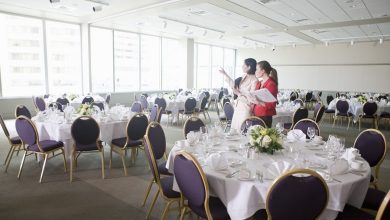How to Choose the Perfect Event Venue for Your Occasion

Selecting the ideal venue for your event can make all the difference in creating a memorable experience for your guests. Whether you’re planning a corporate meeting, a wedding, or a large conference, the venue sets the tone, impacts the logistics, and shapes the overall atmosphere. The process of choosing the perfect venue requires thoughtful consideration of several factors, from the location and size to the amenities offered and the overall ambiance.
This blog post will guide you through the critical steps to ensure you choose the best venue for your event, one that aligns with your goals and provides a smooth, enjoyable experience for everyone involved.
1. Determine Your Event’s Purpose and Goals
Before you begin searching for a venue, it’s essential to have a clear understanding of the event’s purpose. Is it a formal corporate event, a wedding, or a casual gathering? Each type of event will have different needs when it comes to space, ambiance, and facilities. For instance, a wedding venue should offer an elegant setting and flexibility for personal touches, while a corporate meeting might prioritize functionality and technology infrastructure.
Defining your goals helps you narrow down your options and ensures that the venue you choose meets the specific needs of your event. Consider the following questions:
- What message or impression do you want the venue to convey?
- How many people are you expecting?
- Will your event include multiple activities or sessions?
By answering these questions early on, you can better focus your search and choose a venue that complements your objectives.
2. Consider the Location
The location of your event venue is one of the most important factors to consider. It should be easily accessible for your guests, whether they’re traveling from nearby or from out of town. Take into account the proximity to major transportation hubs, such as airports, train stations, or bus terminals, especially if your event involves attendees from different locations.
For local events, choosing a venue near popular landmarks, hotels, and restaurants can enhance the convenience and overall experience for attendees. It’s also important to assess the safety and accessibility of the venue for all potential guests, including those with mobility challenges. Ensure that there are adequate parking options or convenient public transport routes to make travel hassle-free for your attendees.
3. Assess the Venue Size and Layout
The size and layout of the venue should suit the scale of your event. If your event involves a large number of people, the venue must be spacious enough to comfortably accommodate everyone without feeling overcrowded. On the other hand, for smaller, more intimate gatherings, you’ll want a venue that feels cozy but not too cramped.
Consider the layout as well. Does the venue offer flexibility in room configurations? Some events may require different spaces for breakout sessions, while others may only need one large room for the duration of the event. Think about the flow of the event, the placement of stages or screens, seating arrangements, and accessibility between different areas. For instance, if your event includes a stage or a presentation, ensure that the space allows for easy viewing by all attendees.
4. Evaluate the Amenities and Services Offered
Each event venue offers a different set of amenities, so it’s crucial to assess what each venue provides in terms of services and equipment. For corporate events, amenities such as high-speed internet, audiovisual equipment, projectors, and microphones are essential. For more elaborate events, such as weddings or galas, you may also want to ensure the venue offers catering services, tables, chairs, and linens.
Additionally, check if the venue provides in-house event coordinators or staff who can assist with logistical details, such as setting up the event, handling technical issues, or managing registrations. Some venues also offer additional services like valet parking, security, or concierge services, which can enhance the experience for your guests and ensure everything runs smoothly.
It’s also worth considering whether the venue can accommodate any special needs, such as dietary restrictions, accessibility requirements, or child-friendly spaces. Be sure to inquire about any additional fees for these services, so you can manage your budget effectively.
5. Examine the Ambiance and Atmosphere
The ambiance of the venue plays a crucial role in setting the mood and tone for your event. Whether it’s an elegant ballroom, a modern conference center, or a rustic barn, the setting should reflect the theme of your event and appeal to your guests’ expectations. Take a close look at the venue’s interior design, decor, lighting, and overall style.
For weddings or social events, you might want to select a venue that has a charming or sophisticated aesthetic, while for business events, you may prefer a more sleek, contemporary design. Keep in mind that the venue’s ambiance should be adaptable to your event’s needs, and if necessary, you should be able to customize the space to fit your vision through lighting, floral arrangements, or other decorative elements.
6. Review the Venue’s Reputation and Reviews
When selecting a venue, consider its reputation. Research online reviews and ask for recommendations from colleagues, friends, or industry professionals who have experience with venues in the area. Positive reviews can provide insight into the venue’s customer service, event management capabilities, and overall experience.
It’s also helpful to ask the venue for testimonials or case studies from past events. This can give you a sense of the type of events they have hosted before and how they handled logistics and guest services. If possible, arrange a site visit to inspect the venue in person. This allows you to assess the space, meet the staff, and ensure the venue aligns with your expectations.
7. Check Availability and Flexibility
It’s important to verify the availability of the venue for your preferred event date. Popular venues can get booked well in advance, so it’s essential to secure your booking as early as possible. Additionally, be sure to inquire about the venue’s flexibility in case of unforeseen changes. What happens if you need to change the event date or shift the schedule? Understanding the venue’s cancellation or rescheduling policies will help you manage any unexpected situations without added stress.
Ask about the venue’s capacity to handle last-minute adjustments, such as adding more guests or accommodating special requests. Flexibility is key to ensuring the event runs smoothly, even when plans shift.
8. Establish a Realistic Budget
Your budget plays a significant role in determining which venues are within reach. Prices can vary widely depending on the location, size, and amenities offered, so it’s important to have a realistic budget in mind. Be sure to account for all costs, including rental fees, catering, decorations, AV equipment, and any other additional services.
Keep in mind that the most expensive venue is not always the best option. Sometimes, venues with more modest rates may offer more value in terms of customer service, flexibility, or included amenities. Compare venues based on the services they provide in relation to the cost to ensure you’re getting the best deal for your investment.
9. Plan for the Future
While you might have an event planned for this year, think about the long-term relationship with the venue as well. Establishing a good partnership with a venue can be invaluable for future events. A venue that consistently meets your needs and delivers excellent service is a great asset for any event planner or organization.
Final Thoughts
Choosing the perfect event venue requires careful consideration of many factors, including location, size, amenities, and ambiance. By thoroughly evaluating your options and prioritizing your needs, you can ensure that your event is a resounding success. A well-chosen venue creates the foundation for a memorable occasion, allowing you to focus on what matters most—creating a seamless and enjoyable experience for your guests.






